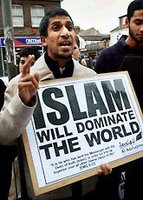Civilization's Nightmare
 This brief history of Islamic expansion explains why they hate us. Mandatory reading for all infidels. Those of you already familiar with the subject may find this excerpt sufficient:
This brief history of Islamic expansion explains why they hate us. Mandatory reading for all infidels. Those of you already familiar with the subject may find this excerpt sufficient:Islam's Imperial Dreams
BY EFRAIM KARSH
Tuesday, April 4, 2006 12:01 a.m. EDT
Whether in its militant or its more benign version, this world-conquering agenda continues to meet with condescension and denial on the part of many educated Westerners. To intellectuals, foreign-policy experts, and politicians alike, "empire" and "imperialism" are categories that apply exclusively to the European powers and, more recently, to the United States. In this view of things, Muslims, whether in the Middle East or elsewhere, are merely objects--the long-suffering victims of the aggressive encroachments of others. Lacking an internal, autonomous dynamic of its own, their history is rather a function of their unhappy interaction with the West, whose obligation it is to make amends. This perspective dominated the widespread explanation of the 9/11 attacks as only a response to America's (allegedly) arrogant and self-serving foreign policy, particularly with respect to the Arab-Israeli conflict.
As we have seen, however, Islamic history has been anything but reactive. From Muhammad to the Ottomans, the story of Islam has been the story of the rise and fall of an often astonishing imperial aggressiveness and, no less important, of never quiescent imperial dreams. Even as these dreams have repeatedly frustrated any possibility for the peaceful social and political development of the Arab-Muslim world, they have given rise to no less repeated fantasies of revenge and restoration and to murderous efforts to transform fantasy into fact. If, today, America is reviled in the Muslim world, it is not because of its specific policies but because, as the preeminent world power, it blocks the final realization of this same age-old dream of regaining, in Zawahiri's words, the "lost glory" of the caliphate.
Nor is the vision confined to a tiny extremist fringe. This we saw in the overwhelming support for the 9/11 attacks throughout the Arab and Islamic worlds, in the admiring evocations of bin Laden's murderous acts during the crisis over the Danish cartoons, and in such recent findings as the poll indicating significant reservoirs of sympathy among Muslims in Britain for the "feelings and motives" of the suicide bombers who attacked London last July. In the historical imagination of many Muslims and Arabs, bin Laden represents nothing short of the new incarnation of Saladin, defeater of the Crusaders and conqueror of Jerusalem. In this sense, the House of Islam's war for world mastery is a traditional, indeed venerable, quest that is far from over.
To the contrary, now that this war has itself met with a so far determined counterattack by the United States and others, and with a Western intervention in the heart of the House of Islam, it has escalated to a new stage of virulence. In many Middle Eastern countries, Islamist movements, and movements appealing to traditionalist Muslims, are now jockeying fiercely for positions of power, both against the Americans and against secular parties. For the Islamists, the stakes are very high indeed, for if the political elites of the Middle East and elsewhere were ever to reconcile themselves to the reality that there is no Arab or Islamic "nation," but only modern Muslim states with destinies and domestic responsibilities of their own, the imperialist dream would die.
0 Comments:
Post a Comment
<< Home